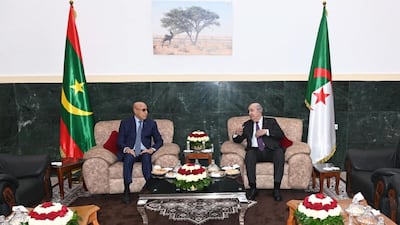On Thursday the presidents of Algeria and Mauritania, Abdelmadjid Tebboune and Mohamed Ould Cheikh Ghazouani, inaugurated a free trade zone between the two countries, Algerian state news agency APS reported.
At the inauguration, which took place in Tindouf commune in the west of Algeria, the two presidents also announced the start of construction of an 840km long road between Tindouf and Zouerate, which will connect the two countries and facilitate the operation of the free trade zone.
It is the first time Algeria has invested in a project outside its own borders since it gained independence in 1962.
Earlier this month, Algeria announced plans to establish free trade zones in 2024 with some of its neighbouring states, including Mauritania, Tunisia, Libya and Niger.
The establishment of such a commercial area means goods can be shipped, handled and exported under specific customs regulations and generally without customs fees.
This project is expected to increase commercial and economic exchanges, and alleviate trade challenges for farmers and businesses from the two countries.
In a joint statement with his Mauritanian counterpart, Mr Tebboune invited Mauritanian investors to benefit from the tax and customs exemptions the project offers, emphasising that “Mauritanian goods and merchandise of clear origin are welcome without tax.”
Mr Ghazouani said the trade agreement “will create a meeting place and an exchange bridge” that will strengthen bilateral co-operation between the two countries.
In recent years, Algeria has been trying to ease its otherwise rigid, hydrocarbons-reliant economic system and move into other sectors in order to compete with neighbouring Morocco.
The Algerian economy has been notorious for heavy state regulation and a lack of openness to international investment, especially from the West.
However, since the mass protests that ended Abdelaziz Bouteflika's 20 years as president in 2019, the Algerian government has shifted its economic strategies and started moving towards greater co-operation with neighbouring countries and global powers such as Russia and China.
The establishment of the free trade zones between Algeria and its neighbouring African states could have geopolitical repercussions in the region, such as a decrease in trade with these states for Morocco.


